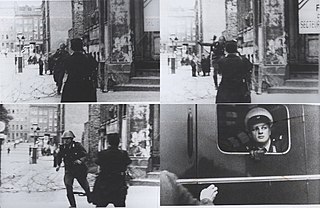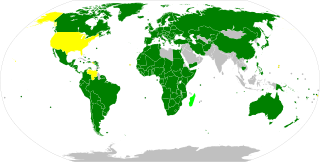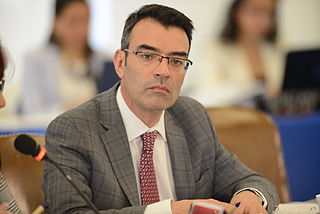Related Research Articles
The Office of the United Nations High Commissioner for Refugees (UNHCR) is a United Nations agency mandated to aid and protect refugees, forcibly displaced communities, and stateless people, and to assist in their voluntary repatriation, local integration or resettlement to a third country. It is headquartered in Geneva, Switzerland, and has 20,305 staff working in 136 countries as of December 2023.

The International Organization for Migration (IOM) is a United Nations related organization working in the field of migration. The organization implements operational assistance programmes for migrants, including internally displaced persons, refugees, and migrant workers.

A refugee, according to the United Nations High Commissioner for Refugees (UNHCR), is a person "forced to flee their own country and seek safety in another country. They are unable to return to their own country because of feared persecution as a result of who they are, what they believe in or say, or because of armed conflict, violence or serious public disorder." Such a person may be called an asylum seeker until granted refugee status by a contracting state or by the UNHCR if they formally make a claim for asylum.
An asylum seeker is a person who leaves their country of residence, enters another country, and makes in that other country a formal application for the right of asylum according to the Universal Declaration of Human Rights Article 14. A person keeps the status of asylum seeker until the right of asylum application has concluded.

An internally displaced person (IDP) is someone who is forced to leave their home but who remains within their country's borders. They are often referred to as refugees, although they do not fall within the legal definitions of a refugee.

A refugee camp is a temporary settlement built to receive refugees and people in refugee-like situations. Refugee camps usually accommodate displaced people who have fled their home country, but camps are also made for internally displaced people. Usually, refugees seek asylum after they have escaped war in their home countries, but some camps also house environmental and economic migrants. Camps with over a hundred thousand people are common, but as of 2012, the average-sized camp housed around 11,400. They are usually built and run by a government, the United Nations, international organizations, or non-governmental organization. Unofficial refugee camps, such as Idomeni in Greece or the Calais jungle in France, are where refugees are largely left without the support of governments or international organizations.
In international law, a stateless person is someone who is "not considered as a national by any state under the operation of its law". Some stateless people are also refugees. However, not all refugees are stateless, and many people who are stateless have never crossed an international border. At the end of 2022, the United Nations High Commissioner for Refugees estimated 4.4 million people worldwide as either stateless or of undetermined nationality, 90,800 (+2%) more than at the end of 2021.

Dadaab is a semi-arid town in Garissa County, Kenya. It is the site of a UNHCR base hosting 302,805 registered refugees and asylum seekers as of 31 October 2023, in four camps, making it one of the largest in the world behind Kutupalong refugee camp. The centre is run by the United Nations High Commissioner for Refugees, and its operations are financed by foreign donors. In 2013, UNHCR, the governments of Kenya and Somalia signed a tripartite agreement facilitating the repatriation of Somali refugees at the complex.

The Convention Relating to the Status of Refugees, also known as the 1951 Refugee Convention or the Geneva Convention of 28 July 1951 is a United Nations multilateral treaty that defines who a refugee is and sets out the rights of individuals who are granted asylum and the responsibilities of nations that grant asylum. The convention also sets out which people do not qualify as refugees, such as war criminals. The convention also provides for some visa-free travel for holders of refugee travel documents issued under the convention.
Nicolas Bwakira was a Burundian diplomat, international civil servant and pan-africanist. During his long and exemplary career, Bwakira took on senior roles and responsibilities at various institutions, including the United Nations High Commission for Refugees (UNHCR), the University of South Africa (UNISA), the African Union, the Institute for Security Studies (ISS) and the Crisis Management Initiative (CMI). Bwakira fought the good fight as a pan-Africanist and international civil servant in the service of Africa and its people, especially for those in Namibia, Angola, Somalia and, more recently, the Lake Chad Basin. The quest for peace was his lifelong passion. From the time of his posting in Angola in 1976, he developed a special connection with southern African countries, among which Namibia. From 1976 to 1990, Namibian refugees and Namibia’s independence featured prominently in his professional career. In his role as Coordinator for the return of Namibian exiles, he was instrumental in negotiating a total blanket amnesty with the apartheid government as a condition for the return of Namibian exiles. Later, as Director for Africa, he negotiated a total blanket amnesty with the apartheid government, as a pre-condition of the return of South African exiles members of liberation movements.

Walter Kälin is a Swiss humanitarian, constitutional lawyer, international human rights lawyer, activist, and advocate. He is also known as a legal scholar and a renowned professor. He has been a leader in changing Swiss laws and international laws for humanitarian purposes and he has been published extensively on issues of human rights law, the law of internally displaced persons, refugee law, and Swiss constitutional law.
Nepal is home to 40,490 refugees officially recognized by the United Nations High Commissioner for Refugees (UNHCR). Indian, Tibetan and Bhutanese refugees account for a large majority of Nepal’s refugee population.

James (Jim) Cavallaro is a professor of law and the co-founder and executive director of the University Network for Human Rights. He teaches human rights at Wesleyan University, where he is a director of the Minor in Human Rights Advocacy, as well as the Wesleyan ACTS for Human Rights program. In addition to Wesleyan, Cavallaro frequently teaches at Yale Law School, and the University of California at Los Angeles (UCLA). He also teaches at Columbia Law School and the University of California Berkeley. Prior to launching the University Network, Cavallaro founded the International Human Rights and Conflict Resolution Clinic at the Mills Legal Clinic at Stanford Law School, United States. In 2018, Cavallaro and Ruhan Nagra founded the University Network for Human Rights, an organization that engages undergraduates and graduate students and their universities in human rights work in the United States and around the world. Cavallaro served as a commissioner (2014-2017) and President (2016-2017) of the Inter-American Commission on Human Rights. Cavallaro received his BA from Harvard University and his JD from University of California at Berkeley School of Law, where he served on the California Law Review and graduated with Order of the Coif honors. He also holds a doctorate in human rights and development from Pablo de Olavide University, Seville, Spain.
A refugee crisis can refer to difficulties and dangerous situations in the reception of large groups of forcibly displaced persons. These could be either internally displaced, refugees, asylum seekers or any other huge groups of migrants.
Virendra Dayal is a retired Indian Administrative Service officer and United Nations civil servant who served as Chef de Cabinet to Secretary General of the United Nations for more than a decade. He has served as the director of the Department of Political and Peacebuilding Affairs of the United Nations and as the special envoy who probed the allegations levelled against a number of India politicians including Natwar Singh, a former Minister of External affairs, in the Paul Volcker Committee report of 2005. A former Indian Administrative Service officer and a Rhodes Scholar of 1956 Dayal sat on the National Human Rights Commission of India as a member for two terms from 1998 to 2006. The Government of India awarded him the third highest civilian honour of the Padma Bhushan, in 1992, for his contributions to society.

The head office of UNHCR's mission in India is located in Delhi, with a field office in Chennai. The current Chief of Mission is Areti Sianni. UNHCR won the Indira Gandhi Prize for Peace, Disarmament and Development in 2015. UNHCR was awarded the Mother Teresa Award for Social Justice by the Harmony Foundation, Mumbai.

Kutupalong refugee camp is the world's largest refugee camp. It is located in Ukhia, Cox's Bazar, Bangladesh, and is inhabited mostly by Rohingya refugees who fled from ethnic and religious persecution in neighboring Myanmar. It is one of two government-run refugee camps in Cox's Bazar, the other being the Nayapara refugee camp.
Migration and Asylum Project (M.A.P.), formerly known as the Ara Legal Initiative, is a refugee legal aid centre based in New Delhi, India. It provides legal aid and counselling to asylum seekers and refugees in India.

Volker Türk is an Austrian lawyer and United Nations official. He has been the UN High Commissioner for Human Rights since October 2022.
References
- ↑ "Shamsul Bari". The Daily Star. 2015-11-08. Retrieved 2023-11-28.
- ↑ "Board of Trustees". BLAST. Retrieved 2023-11-28.
- 1 2 "Asian Studies Center :: Events". asia.isp.msu.edu. Retrieved 2023-11-28.
- 1 2 "Human Rights in Practice: Dr. Shamsul Bari | University of Minnesota Law School". law.umn.edu. Retrieved 2023-11-28.
- ↑ "Voluntary Repatriation EC/SCP/41". UNHCR . 1 August 1985. Retrieved 28 November 2023.
- ↑ "Solution to the Refugee Problem and the Protection of Refugees EC/SCP/55". UNHCR . 23 August 1989. Retrieved 28 November 2023.
- 1 2 3 4 "Conference Keynote Speakers and Panelists || 18th International Entrepreneurship Conference". ieforums.org. Retrieved 2023-11-28.
- ↑ "The UN Independent Expert on Somalia, Dr. Shamsul Bari, issues a strong warning on the security, human rights and humanitarian situation in the country". Office of the High Commissioner for Human Rights. 28 January 2010. Retrieved 28 November 2023.
- ↑ "Chronology of Events". UNPOS. Retrieved 2023-11-28.